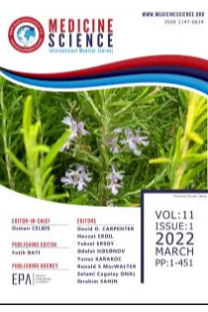Evaluation of infections in neurological diseases in a palliative care centre
___
1. World Health Organization (WHO). WHO Definition of Palliative CareAvailable at: http://www.who.int/cancer/palliative/definition/en/ access date 30 September 2020.2. Boersma I, Miyasaki J, Kutner J et al. Palliative care and neurology: time for a paradigm shift. Neurology. 2014;83:561-7.
3. Vitetta L, Kenner D, Sali A. Bacterial infections in terminally ill hospice patients. J Pain Symptom Manage. 2000;20:326-34.
4. Datta, R, Juthani-Mehta M. Burden and management of multidrug-resistant organisms in palliative care. Palliat Care. 2017;10:1178224217749233.
5. Homsi J, Walsh D, Panta R et al. Infectious complications of advanced cancer. Support Care Cancer. 2000;8:487-92.
6. Rosenberg JH, Albrecht JS, Fromme EK et al. Antimicrobial use for symptom management in patients receiving hospice and palliative care: a systematic review. J Palliat Med. 2013;16:1568-74.
7. Reinbolt RE, Shenk AM, White PH et al. Symptomatic treatment of infections in patients with advanced cancer receiving hospice care. J Pain Symptom Manage. 2005;30:175-82.
8. Baghban A, Juthani-Mehta M. Antimicrobial use at the end of life. Infect Dis Clin North Am. 2017;31:639-47.
9. Juthani-Mehta M., Malani PN, Mitchell SL. Antimicrobials at the end of life: an opportunity to improve palliative care and infection management. Jama. 2015;314:2017-8.
10. Yajima R, Ise Y, Wako T et al. A retrospective study of risk factors for infection in cancer patients receiving specialist palliative care. J Nippon Med Sch. 2013;80:481-5.
11. Rivera-Lara L, Ziai W, Nyquist P. Management of infections associated with neurocritical care. Handb Clin Neurol. 2017;140:365-378.
12. O'Horo JC, Sampathkumar P. Infections in Neurocritical Care. Neurocrit Care. 2017;27:458-67.
13. White PH, Kuhlenschmidt HL, Vancura BG et al. Antimicrobial use in patients with advanced cancer receiving hospice care. J Pain Symptom Manage. 2003;25:438-43.
14. Schönenberger S, Al-Suwaidan F, Kieser M et al. The SETscore to predict tracheostomy need in cerebrovascular neurocritical care patients. Neurocrit Care. 2016;25:94-104.
15. Allareddy V, Rampa S, Nalliah RP, et al. Prevalence and predictors of gastrostomy tube and tracheostomy placement in anoxic/hypoxic ischemic encephalopathic survivors of in-hospital cardiopulmonary resuscitation in the united states. PLoS One. 2015;10:e0132612.
16. Pignatti P, Balestrino A, Herr C et al. Tracheostomy and related hostpathogen interaction are associated with airway inflammation as characterized by tracheal aspirate analysis. Respir Med. 2009;103:201-8.
17. Lusuardi M, Capelli A, Cerutti CG et al. Influence of clinical history on airways bacterial colonization in subjects with chronic tracheostomy. Respir Med. 2000;94:436-40.
18. Davies E, Higginson I (eds). Palliative care. The solid facts. http://www. euro.who.int/__data/assets/pdf_file/0003/98418/E82931.pdf access date 29 September 2020.
19. Lynn J, Adamson DM. Living well at the end of life. Adapting health care to serious chronic illness in old age. RAND CORP SANTA MONICA CA.2003
20. Halperin JJ, Moran S, Prasek D et al. Reducing hospital-acquired infections among the neurologically critically Ill. Neurocrit Care. 2016;25:170-7.
21. Kaye KS, Marchaim D, Chen TY et al. Effect of nosocomial bloodstream infections on mortality, length of stay, and hospital costs in older adults. J Am Geriatr Soc. 2014;62:306-11.
22. Gleeson A, Larkin P, Walsh C et al. Methicillin-resistant Staphylococcus aureus: Prevalence, incidence, risk factors, and effects on survival of patients in a specialist palliative care unit: A prospective observational study. Palliat Med. 2016;30:374-81.
- ISSN: 2147-0634
- Yayın Aralığı: 4
- Başlangıç: 2012
- Yayıncı: Effect Publishing Agency ( EPA )
Comperative outcomes of the patients undergoing percutaneous and open trigger finger release
Duran TOPAK, Fatih DOĞAR, Burak KUŞCU, Ali Aydın KARADENİZ, Ökkeş BİLAL
Corona Virus Disease 2019 pandemic and the role of Quarantine in containment of the infection
Saurabh RamBihariLal SHRIVASTAVA, Prateek Saurabh SHRIVASTAVA
Changes in mean platelet volume in the course of upper gastrointestinal bleeding
Gökhan KARAKAYA, Ömer KAN, Gökhan TAZEGÜL, Orhan ARAS
Evaluating the effectiveness of the national hip dysplasia early diagnosis and treatment program
Emre ERGEN, Ersen TÜRKMEN, Mehmet Fethi CEYLAN, Mehmet ASLAN, Selma FELEK
Evaluation of infections in neurological diseases in a palliative care centre
Doğan AKDOĞAN, Gülhan SARIÇAM, Kadriye KAHVECİ
Strengthening the global diagnostic capacity in the battle against Corona Virus
Saurabh RamBihariLal SHRİVASTAVA, Prateek Saurabh SHRİVASTAVA
Assessment of the risks of the workplace and the awareness of healthcare professionals
Trauma during pregnancy: Assessment of cases from a forensic medical aspect
Özlem ÖZGÜR GÜRSOY, Tuğrul KILIBOZ, Beycan DOĞAN, Kenan KARBEYAZ
